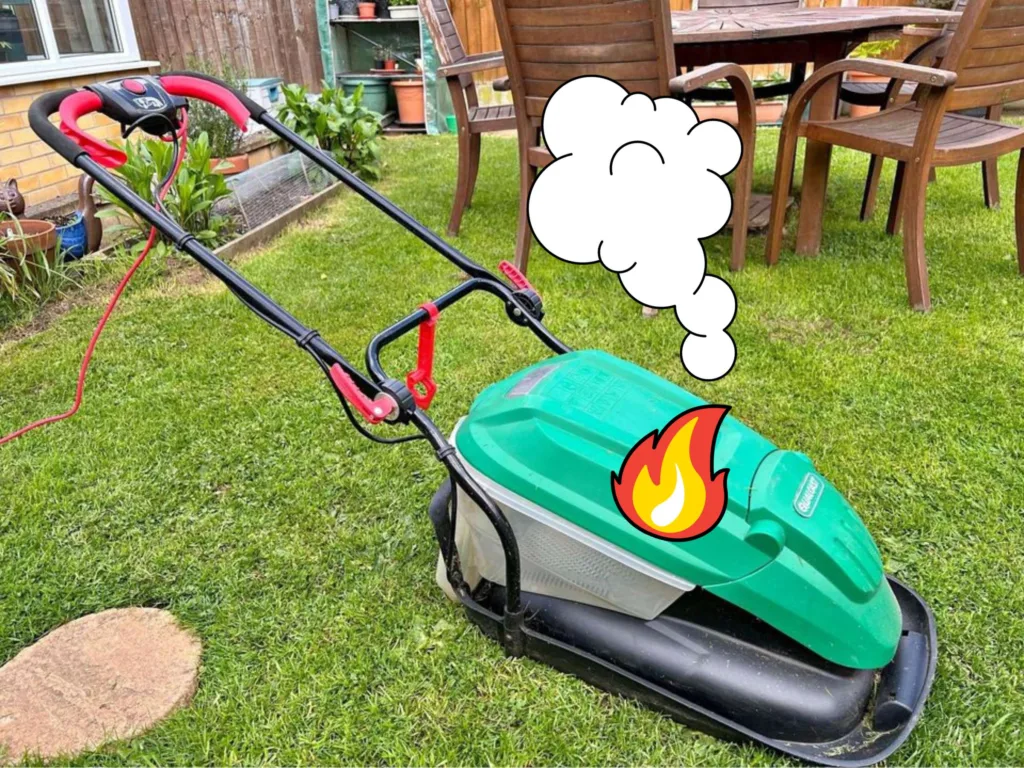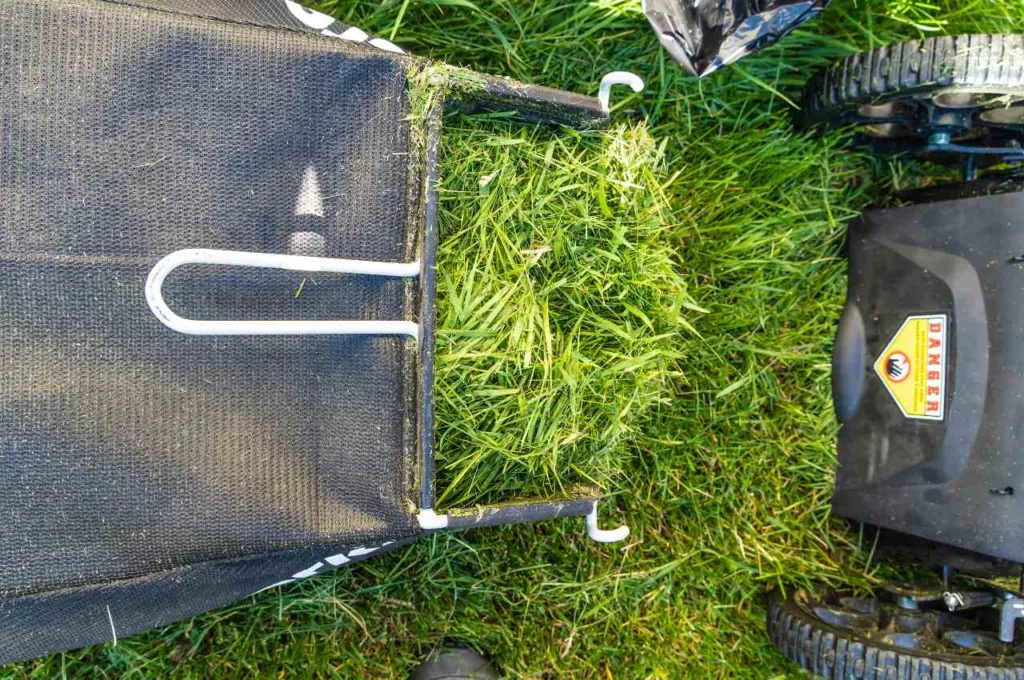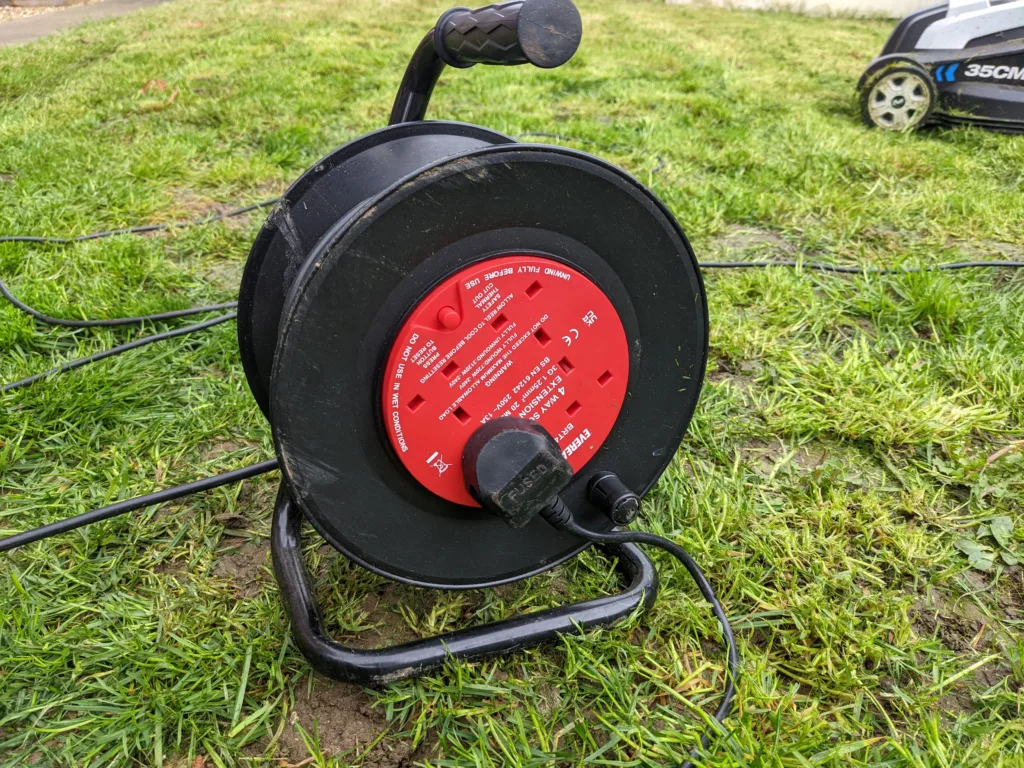Wondering whether it’s possible for your electric mower to overheat?
I’ve used my knowledge of electrical lawn equipment and my experience in the industry to answer the common question, “Can electric lawn mowers overheat?”
✅Key Takeaways:
Yes, electric mowers can overheat.
Some of the common reasons why electric lawnmowers overheat include an obstructed blade, overusing the mower, clogged air vents, a dull blade, and electrical issues.
To prevent an electric mower from overheating, make sure to perform regular maintenance, including sharpening the blades and cleaning the air vents, and avoid using the mower for extended periods and cutting long grass.
Table of Contents
🤷♂️Can An Electric Lawn Mower Overheat?
Yes, an electric lawn mower can indeed overheat. An electric lawn mower overheating is often the result of overusing the mower or resistance due to factors like dull blades, clogged air filters, mowing overgrown grass, or mowing in hot conditions.
If your electric mower overheats, it can lead to reduced performance, potential damage to internal parts, and even safety hazards. To prevent overheating, I strongly recommend keeping on top of regular maintenance tasks, including blade sharpening and air vent cleaning. Also make sure to schedule breaks when you’re using the mower for an extended period and ensure the mower gets proper ventilation around the mower. I’ve discussed these tips in more detail later.
📑 7 Reasons Why An Electric Lawn Mower Might Overheat
The most common reasons why electric lawn mowers overheat are as follows:
Reason 1: The Blade Is Obstructed
As you mow your lawn, your mower deck will gradually accumulate grass, twigs, and other debris. In most cases, there won’t be enough debris to affect your mower’s performance. However, a very clogged cutting deck could obstruct the mower’s blades, causing them to work harder and generate extra heat. This could cause your mower to overheat.
Reason 2: You’re Overusing The Mower
Using your lawn mower heavily or excessively is another common reason why it might overheat. Using the mower for a prolonged period will put excessive strain on the lawnmower motor, causing it to overheat. Overheating is a likely outcome if you use your mower consistently for intervals of 30 minutes or longer.
Reason 3: Your Mower Blade Is Dull
A dull mower blade doesn’t only affect the quality of the finished cut – it also increases the likelihood of lawn mower overheating. When your mower blades are dull, they won’t be able to cleanly and efficiently cut through grass. This increases the resistance, and the motor will have to work harder to power the blades with enough force to cut their grass, increasing friction and heat.
Reason 4: The Air Vents Are Clogged
Your lawn mower’s air vents play an important part in keeping the mower cool. When the air vents become clogged with grass clippings, dirt, and other debris from your lawn, they obstruct the flow of fresh air. As a result, less cool air reaches the motor and internal parts, so the system overheats.
Reason 5: Electrical Issues
Like every electrical item, electric mowers have the potential to experience electrical issues that lead to overheating. Electrical faults can cause your mower to overheat by disrupting the normal flow of electricity within the mower’s components. When issues like faulty wiring, damaged connections, or malfunctioning switches or circuitry, occur, they can create resistance in the electrical circuit. This resistance generates excess heat, leading to the mower overheating.
Reason 6: Your Mower Is Old And Worn
If your electric lawn mower is more than 5-7 years old, it’s more likely to overheat due to prolonged usage and age-related deterioration, which affect its ability to cool its internal components as it’s supposed to. In my experience, components like the motor and bearings are prone to experiencing increased friction in older mowers, leading to higher heat generation. Plus, wear and tear can affect the electrical connections and wiring, potentially causing electrical resistance – again causing overheating.
Reason 7: You’re Mowing Long Grass
Finally, mowing long grass is one of the reasons electric mowers overheat because it puts a greater strain on the mower’s motor. Longer grass needs more power to cut, and the increased resistance means that the motor has to work harder, generating extra heat in the process. As the motor strains to cut through tall grass, it generates extra heat, possibly leading to the mower overheating.

🔥 Signs Of An Electric Mower Overheating
Here are the four key signs to look out for that tell you an electric lawn mower is overheating:
Reduced performance – Overheating can cause a noticeable decrease in your mower’s cutting efficiency. The blades may struggle to cut through your grass properly, leaving uneven patches or uncut areas.
Unusual smells – Any funky burning smells coming from your mower are a clear sign that it’s overheating.
A hot exterior – It’s normal for a lawn mower to heat up while it’s in operation, but if it’s almost too hot to touch, it suggests the internal components are overheating.
Sudden shutdown – If your mower has a thermal overload system, it’ll shut down suddenly, likely before it overheats the point that you notice any of the above signs.
🥵 What Happens If My Electric Lawn Mower Overheats?
If you ignore (or don’t notice) the signs of your electric mower overheating, the likely outcome is that your lawn mower will simply shut off, and you won’t be able to turn it on again until the system has cooled.
Most modern lawn mowers have a built-in thermal cut-off switch that means they’ll automatically shut down when the internal temperature gets too high. This handy safety feature means that the risk of any serious dangers, such as fire or electric shock, is low.
If your lawn mower does shut off, you’ll have to wait for it to cool down before you start it again. This cooldown period generally takes around 30 minutes. My advice is to unplug the mower and leave it in an open space while you wait for it to cool.
👍 How To Prevent An Electric Mower From Overheating
Now we know the potential causes of an electric lawn mower overheating, here are my general tips for reducing the potential for your mower to overheat:
🛠 Perform Regular Maintenance
Make sure to commit to your mower’s required maintenance schedule, including cleaning the air vents and sharpening the blades at least once a year. You may also need to completely replace worn-out blades – you can find new blades for electric rotary mowers on Amazon. This will prevent some of the issues that are associated with electric mower overheating (namely dull blades and blocked air vents).
😤 Don’t Overuse The Mower
My next tip is something you shouldn’t do rather than should: don’t overuse your mower. If you have a big job, take regular breaks, especially if you’re mowing in the height of summer. It’s best to only mow for 30 minutes straight before giving the mower a 5-minute break to cool down. Both the mower and your own body will thank you for the rest stops!
📏 Avoid Cutting Long Grass
Here’s more advice on what not to do: don’t use your mower to regularly cut long grass. Letting your lawn grow long on the rare occasion is fine, but if you regularly wait until your garden resembles a mini jungle before getting out your electric lawnmower, you’ll put more strain on the motor every time you mow, increasing the likelihood of overheating. I strongly recommend mowing your lawn once or twice a fortnight during the height of the grass growing season (June to August).

🧐 Inspect Your Mower Regularly
It’s true that many of your mower’s electrical components are out of sight, but I still recommend inspecting any electric parts that you can see before you use your lawn mower. If anything looks faulty or out of place, troubleshoot the issue before it leads to overheating.
🔌 Choose The Right Extension Cord
Many of us resort to using an extension cord with our electric lawn mowers, but this in itself can be the cause of dangerous overheating. Using an extension cord with an insufficient amperage rating may cause the cord itself to overheat. To prevent this from happening, check both the mower’s amperage rating and the cord’s amperage rating (which you should find on the cord’s packaging). Make sure the cord’s amperage rating can comfortably handle the mower’s current load without overheating.

💰 Buy A New Mower
Finally, if your electric lawn mower is overheating due to simply being old and worn, it might be time for a new mower. Go for a high-wattage mower that’s suitably sized for your lawn. We’ve researched, reviewed, and shortlisted our current favourite electric mowers in this guide to the best corded electric lawn mowers.
🏁 Final Word
I wrote this guide because I couldn’t find any other resources that provided quality, clearly-defined information on the common causes of electric mowers overheating, how to detect and prevent overheating issues, and more. I hope that you were able to find the answers you were looking for here. If you found this article helpful, you might also like:
